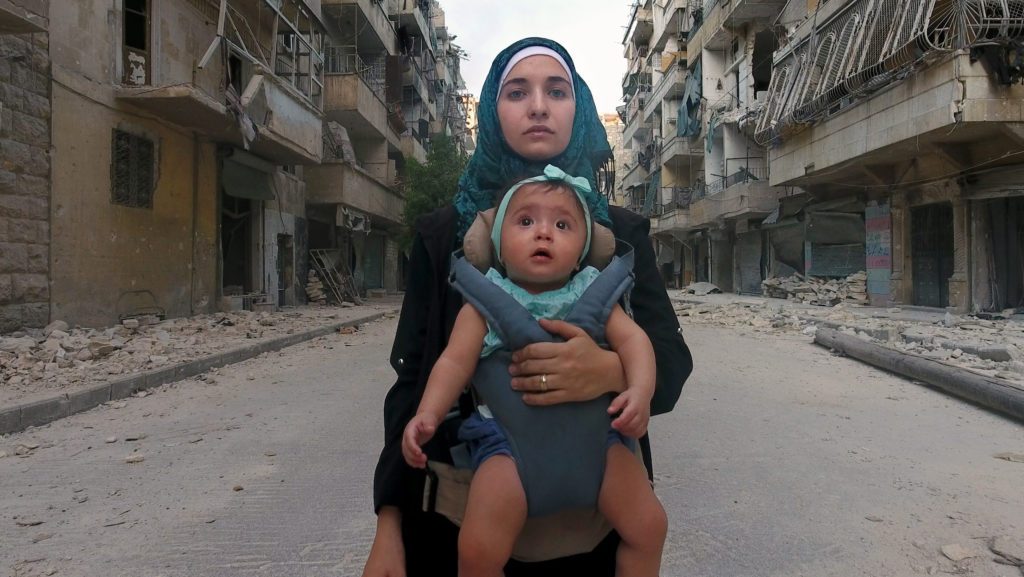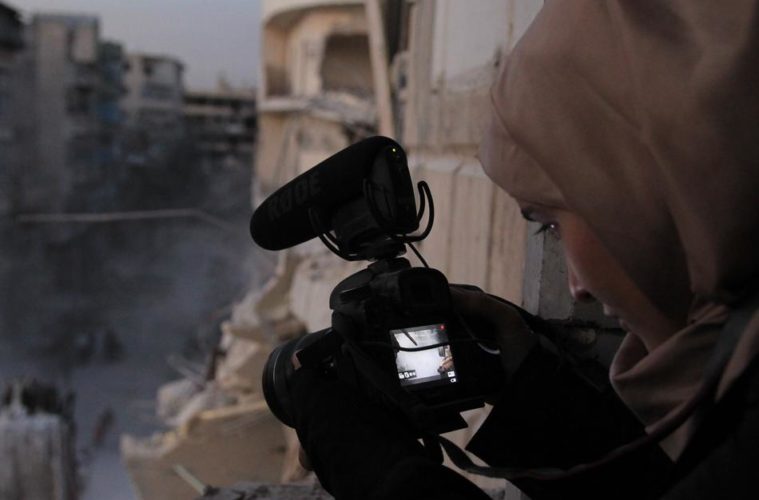The Battle of Aleppo ended three years ago with Bashar al-Assad strangling the rebel’s supply line. Waad Al-Kateab joined the civil uprising in 2011 shortly after graduating with a degree in economics. Al-Kateab documented the experience using her phone, the go-to device for capturing underrepresented voices in documentary and fiction. Her film For Sama resulted from years of footage, co-directed by Edward Watts, who helped to compile the footage.
Sama is Waad and Hazma’s daughter, who was born in the Battle’s final year. Waad narrates and reflects on the world Sama was born into; she wants the best for her daughter and her country, but as friends from the rebellion die and Hazma’s hospital is destroyed by a bomb, hope is in short supply. For Sama is a diary of Sama’s first year and Waad’s experience marrying and having a child during the civil war. Waad’s documentary is a female voice bursting through violent oppression as a signal flare to freedom fighters in Syria and allies around the world.
We spoke with co-directors Waad Al-Kateab and Edward Watts about Assad making Aleppo unlivable by destroying hospitals and homes, why Westerners have difficulty believing the extent of his barbarism, and how Al-Kateab’s footage went from home video to a documentary playing at Cannes.
The Film Stage: There are competing ideas about what Bashar al-Assad has done to Syria. I want to hear from you what he’s done to your country.
Waad Al-Kateab: We’ve been beaten and displaced because we were protesting. Our people have been killed by violent shooting at the protestors. We’ve been arrested and kidnapped and no one knows even where are the prisons and we have been tortured to death. They have destroyed whole cities. We have been bomb-shelled by all the weapons you can imagine and none you can imagine.
Edward Watts: And that’s just the citizens. As for the country itself, destroying all the infrastructure. Agreements and contracts are being signed with Iranians and Russians that no one knows about. Not even Assad’s supporters know what’s going on with those.
What does Assad gain from destroying the country?
Al-Kateab: Controlling Syria, being the great dictator. You can hear now what the locals and media are saying about the next generation of Syrian rulers: his sons will be ruling next. They believe in an idea that Syria belongs only to this family. That nothing is out of their control.
Why did you start filming the Aleppo revolution in 2011?
Al-Kateab: When I was a student in 2011 we know Syria was full of corruption and injustice and we are just the animals of Assad’s farm. All of our dreams before were to leave Syria and begin to start our own lives individually without any care of the public, but we are Syrians and we want to live in our own country the way we want.
Toward the end of the documentary, the bombers targeted your second hospital. Why were they targeting the hospital? It’s one thing to control the infrastructure, but it’s another thing to kill those who are already victims.
Watts: They bombed hospitals to make it impossible to live in that area, and to break the will of the people to live there. For example, losing the hospital made it impossible for a woman to receive gynecological care, much less general medicine. It’s just impossible to live without a healthcare system. There are so many interviews I have done as a doctor and I have been asked several times if we were sure we were chemically attacked. I tell them come investigate for yourself.
It’s hard for us in the West to see the unrepentant and relentless violence of the Assad regime. They say there must be a rational reason for it or a way for us to explain it. But the simple truth is, and this was told to me early on by somebody in the American government: the Assad regime made the decision right at the beginning of the revolution, they would torture old ladies and destroy embassies and hospitals. Do anything in the world to stay in power. There’s a famous phrase said by the thugs in the regime “Assad or we burn the country.” That is the explanation for everything you see.
Will you talk about turning Al-Kateab’s footage into a documentary? Was it always intended to become a documentary?
Al-Kateab: I was just going about day by day, I had no idea if I was going to survive. I was just trying to capture as much footage as I can, and hopefully one day somebody will take these photos and use them for a documentary or just as evidence of what was happening on the ground, to counter the propaganda from Russia and Assad regime. In 2016, I was working with a daily news program on Channel 4 and we did over twenty reports about Syria. When I left Aleppo, I went to London and we talked about making a longer story about what’s going and what I went through. At that time they introduced me to Edward and I showed him all the footage I had. It took two years before we finished the film as you’ve seen it.

Have you received negative pushback about the documentary?
Al-Kateab: Not so far.
Watts: The Russian regime has a history of trying to discredit films and pieces that show the truth of what they’ve been doing, but so far nothing.
How can interested viewers help your cause?
Watts: We’re building and impact campaign. The first thing to do is spread the word about the film, follow us on social media, we have a website. We are putting together a campaign which will offer a range of actions for individuals to take which will hopefully be launching in September. But for now, talking about the film, spreading the word about the film, following us, it would be a great first step.
Al-Kateab: I want mothers and women who clearly have something to share to record it. Whatever the story is, everything is important in this life. Anything could inspire other people and encourage them. As a female filmmaker, I want to see more stories about women in their own words. Also, I want journalism come back to the point of its existence: to make a difference in this world.
For Sama is now in limited release and expanding.

